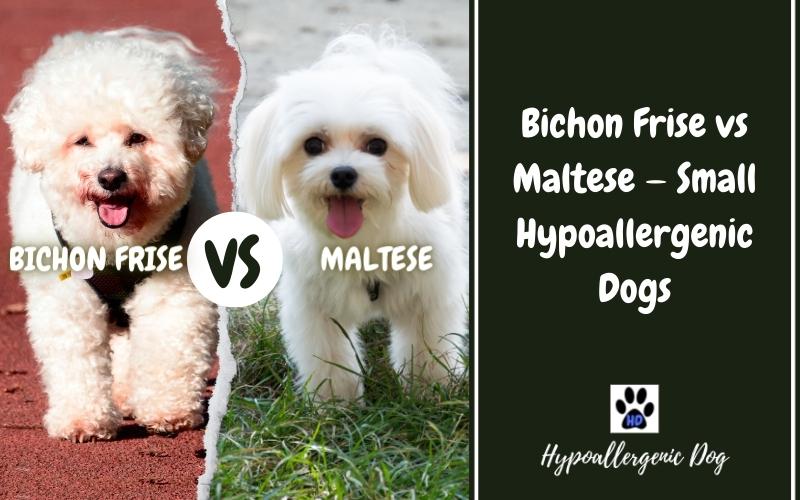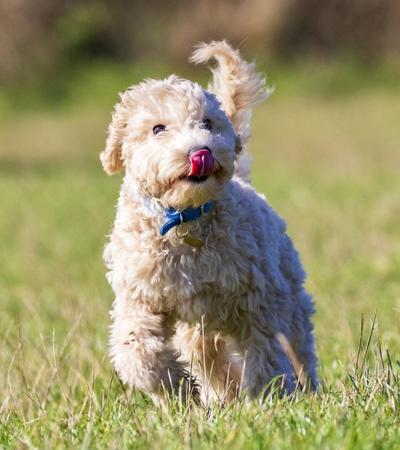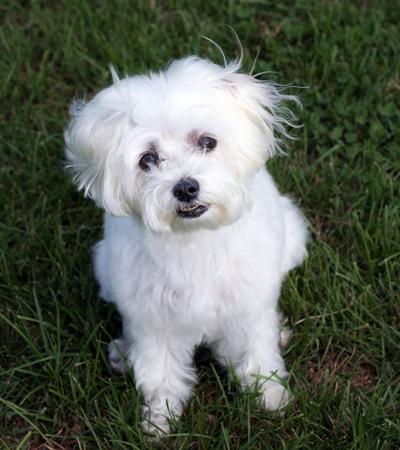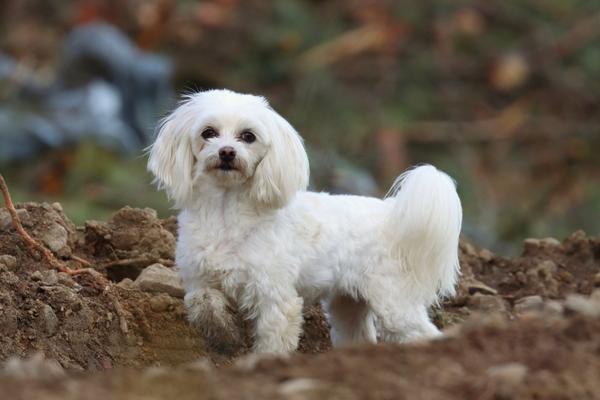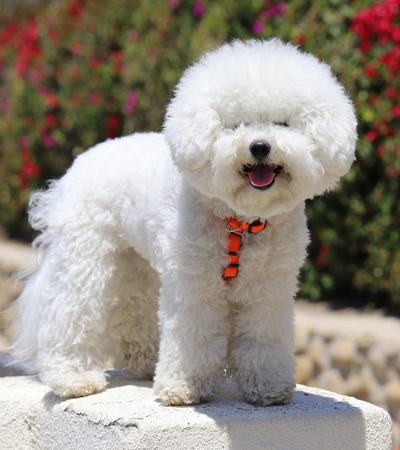Bichon Frise vs Maltese – The Similarities and Differences
If you’re looking to introduce a small white dog into your family, you may be considering either a Bichon Frise vs Maltese. Both of these breeds are similar in size and full of fun. Plus, their hypoallergenic coats make them a great choice for people with dog allergies.
However, there are traits that set these two apart. So, if you’re debating the Bichon Frise vs Maltese, keep reading.
Bichon Frise
Maltese
Temperament
Lively
Affectionate
Loyal
Happy
Energetic
Peppy
Intelligent
Loving
Gentle
Compassionate
Intelligent
Kind
Focused
Loyal
Alert
Energetic
Friendly
Family Dog
Yes
Yes
Height
9.5 - 11.5 inches
7 - 9 inches
Weight
12 - 18 pounds
5 - 7 pounds
Cost
$1000 - $4000
$1000 - $2500
Hypoallergenic
Yes
Yes
Lifespan
14-15 years
12-15 years
Coat
White
White
Trainability
Highly intelligent - easy to train if patient.
Intelligent and easy to train with praise and positive rewards.
The Bichon Frise is a small dog, well known for its fluffy white coat and excitable personality. Originating from Spain and France, Bichons were bred to hunt rats and other rodents, specifically on working ships.
This pooch also has a high status, as they became lap dogs for royalty. Despite their noble heritage, the Bichon can also add circus performer to its resume. However, in today’s society, this breed is popular among dog lovers of all ages, as they make loyal and happy pets.
Bichon Frise dogs are a great choice for people living in small apartments or those who just don’t want a large dog around the house. This breed has a hypoallergenic coat and is, therefore, suitable for people who suffer from dog allergies.
This breed is playful and lively, and their high energy may be a good fit for a house full of children — yet they shouldn’t be left alone with tiny tots. If you have other pets, a Bichon Frise will likely want to play and will adapt well to living with other animals.
Bichon Frise dogs have an affectionate and gentle nature and make friendly and compassionate therapy dogs. Whether you’re young or old, a Bichon Frise will be a loyal and loving furry best friend.
Bichon Frise Pros
- Only need 30 minutes of exercise a day.
- Loyal and loving personality.
- Hypoallergenic coat.
- Good family dog.
Bichon Frise Cons
- High maintenance coat.
- Stubborn streak.
- Premium price tag.
The Maltese breed also has an ancestry rooted in rodent hunting and its heritage is linked to the island of Malta (although the exact location of origin remains unknown). This breed is thousands of years old and evidence of these dogs has been found depicted in ancient Egypt.
Maltese dogs are unwavering in loyalty to their owners, but don’t always like strangers. Due to this dislike of anyone they don’t know, Maltese make excellent watchdogs. Although, their size means they’re unlikely to scare intruders away! A pet Maltese will be full of love and energy but they’re often on high alert and prone to separation anxiety.
The Maltese is a loyal and loving small, hypoallergenic dog. In fact, this breed is so loyal, they may bark excessively at strangers and want to protect their owner and home — despite being tiny! A Maltese dog will slot right into a small living space, and doesn’t demand too much time, in terms of exercise.
Maltese dogs are affectionate companions and are well suited to senior pet owners. However, they have a lively side and enjoy the company of youngsters. While a Maltese will make a fun-loving family dog, their small size means they may not be the best choice for families with very young children.
What’s more, with its luxurious, lengthy coat, grooming can be a demanding task, therefore, ensure you can dedicate the time before committing.
Maltese Pros
- Loyal watchdog.
- Gentle and affectionate nature.
- Minimal exercise needs.
Maltese Cons
- Can suffer from separation anxiety.
- High maintenance coat.
- May not be safe in homes with young children/larger dogs.
Both the Bichon Frise and Maltese are small, but which is the smallest? Well, there is a clear winner here — Maltese dogs are not only shorter, but much lighter too.
When looking at a full grown Bichon Frise vs Maltese:
- The Bichon can grow up to 9.5-11.5 inches and weigh anywhere between 12 and 18 pounds.
- Maltese dogs usually only reach 7-9 inches tall and weigh between 5 and 7 pounds.
No one wants a grumpy or aggressive dog, right? Well, you won’t have to worry about either of those with a Bichon Frise or Maltese. Both of these breeds make loving and loyal companions. These small dogs enjoy spending the majority of their time with their owners and possess a gentle and kind nature.
Behavior
Maltese dogs are friendly yet alert little pooches. This means they will bark often if someone knocks on the door and can become very protective of their family home. This isn’t a bad thing, but be aware that it may take a while for your Maltese to become comfortable with strangers. A Bichon Frise, on the other hand, is likely to have a more relaxed nature.
Both the Maltese and Bichon are intelligent, affectionate, and enjoy spending time with all members of the family. These little bundles of energy love to play and have fun. Both dogs are friendly companions — the Bichon is often used as a therapy dog in settings, such as hospitals and retirement homes.
Separation Anxiety
Before you fall for their cute appearance and excitable personalities, it’s important to note that both of these breeds suffer from separation anxiety. If you work for several hours outside of the home, both a Bichon Frise or Maltese will likely bark excessively in your absence and may even turn to destructive behaviors.
Maltese and Bichon Frise are clever dogs and their intelligence can make training easy, as long as you use suitable methods and techniques.
Bichon Frise
Known to be tricky to house train during those early puppy days. However, if you’re consistent with your approach, and have patience and positivity, it shouldn’t take your Bichon long to learn the house rules. This bow-wow has the brains and the drive to please their owners. You just need to work through their stubborn streak, and your puppy will learn good behavior, commands, and new skills.
Maltese
In comparison, a Maltese may be a little easier to train — they particularly enjoy learning and showing off new tricks. Like the Bichon, the Maltese will need to be trained from a young age. While intelligent, they need plenty of praise and positive reinforcement to quickly learn good behaviors.
Bichon Frise vs Maltese Price
When comparing Bichon Frise vs Maltese price, the cost of a puppy can vary significantly depending on where you buy them and what their lineage is. Pedigree dogs, with all of their documentation, are always the most expensive, but there can be a broader price range on the private market.
On average, a Bichon Frise puppy can cost between $1000 and $4000. If you want a Maltese, you can look to spend much less. The average price of a Maltese puppy is anywhere between $1000 and $2500.
Bichon Frise vs Maltese Shedding
Now let’s take a closer look at which breed sheds more, the Bichon Frise or Maltese?
Maltese
Maltese dogs have a long and silky coat, they’re hypoallergenic and will not trigger or exacerbate dog allergy symptoms. The coat of the Maltese has a similar texture to human hair and will only shed mildly throughout the year.
Bichon Frise
In contrast, the Bichon Frise has a long and curly double coat. This breed has a fluffy texture to its fur, and the curls can sometimes resemble the coat of a Poodle.
However, while they may be super fluffy, Bichons are considered to be light shedders — mildly losing fur throughout the year. You may notice a little more shedding during the seasonal changes, but the Bichon Frise is classed as a hypoallergenic dog — their shedding isn’t enough to cause problems for people with dog allergies.
If you want a low-maintenance dog, neither of these breeds are the pooch for you! Both the Bichon Frise and Maltese require regular grooming to keep their coats under control and in top condition.
Brushing
The long silky coat of a Maltese will need to be brushed daily, this will stop it from becoming knotty and matted on the bottom. If you’ve decided to cut your Maltese coat short, you will still need to brush it once every three days.
A Bichon Frise also needs daily brushing, even though its coat is shorter.
Bathing
You should aim to bathe both a Bichon Frise and Maltese around once every week or two. Make sure to brush out any knots before putting your dog in the bath. Once they get wet, any matting can become worse and even more difficult to remove.
Grooming
A full ‘service groom’ is needed monthly for both of these breeds. During these professional grooming sessions, your dog will have their fur cut back, especially around their face and eyes, and they will be bathed and have their nails trimmed.
Teeth
It’s important to look after your dog’s teeth. It’s suggested you brush your Bichon’s teeth once a week, and the Maltese may need their teeth cleaned more frequently, around three times a week.
The Maltese and Bichon Frise are both very small dog breeds and they have tiny little legs. However, do not let their small size fool you! These dogs are peppy pups, full of energy — they love to run around and play.
Maltese
Maltese dogs are prone to bad behavior if they aren’t exercised regularly and allowed to burn off energy. You will need to walk your Maltese for approximately 30 minutes a day.
Love hiking? Don’t expect your Maltese to become your new walking buddy on your adventures. While they’re energetic, these dogs do have small legs and will likely get tired if walked too far and for too long.
Bichon Frise
Due to their slightly larger size, Bichon Frise can be walked a little more than Maltese dogs. However, around a minimum of 30 minutes per day should be sufficient.
Both of these dogs are at their happiest and healthiest when walked every day.
Trying to find the perfect small white dog that’s friendly and also hypoallergenic? Look no further, both the Maltese and Bichon Frise meet this criterion.
The Bichon Frise is the larger of the two, and can be a little more difficult to house train. A Maltese is more alert and more cautious of strangers. But, both breeds have a gentle and affectionate nature.
Regardless of which one you choose, you need to have the time to look after their high-maintenance coat. Either way, when it comes to Bichon Frise vs Maltese, they’re both fun-loving and happy dogs that will bring lots of joy to your life.
Does Bichon Frise Bark a Lot?
The Bichon Frise isn’t known for excessive barking. However, they enjoy attention and affection and may become vocal to get what they want! This breed also suffers from separation anxiety and may bark when left home alone.
Are Bichons Hard to Potty Train?
It can be difficult to housebreak a Bichon Frise puppy. This breed is known to have a stubborn streak and this can cause difficulties during potty training. However, with patience, a gentle approach, and lots of positive reinforcement, a Bichon Frise can be house-trained.
Is a Maltese Smaller Than a Bichon Frise?
Yes. Head on up to our Bichon Frise vs Maltese Size section for the finer details.
Are Bichon Frise Dogs Good for First-Time Owners?
Absolutely. Bichon Frise is a gentle, affectionate dog and relatively easy to train. This pooch will respond well to patience and positive reinforcement, and a first-time dog owner should be able to train this breed.
Is a Maltese a Good Family Dog?
Indeed. Thanks to their gentle and friendly nature, Maltese dogs slot in well to family life and enjoy spending time with people of all ages.
What Two Dogs Make a Bichon?
The Bichon descends from a Poodle-type dog and a Barbet or a Water Spaniel. But they aren’t a mixed breed and are recognized by the AKC.

